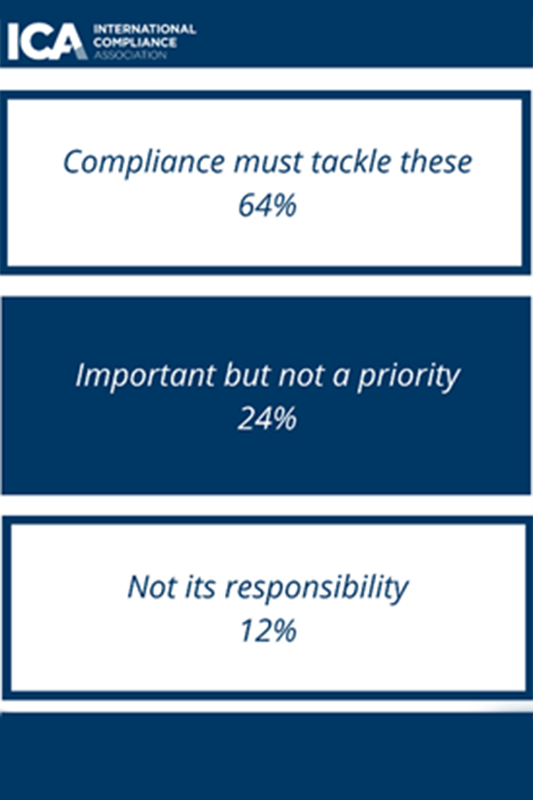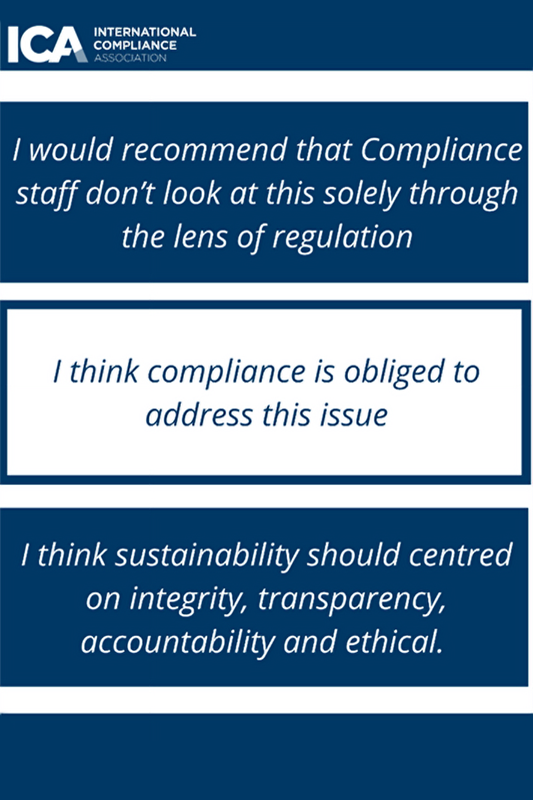Written by David Povey on Monday 6 September, 2021
Sustainability is as old as human existence itself, but it is only recently that it has been thrust into the limelight as an international issue of concern. The potentially catastrophic implications of climate change have elevated sustainability as a priority topic, particularly as most businesses know that their customers will not accept poor environmental practice. Yet one area that is yet to fully confront the sustainability challenge is compliance. This is less due to negligence, and more about discovering how it affects a firm and what compliance can do to support it in their organisation.
Recently, we conducted a poll of ICA members and the wider compliance community on sustainability and the role compliance has in addressing it. The results were not only revealing, but pointed to a potential new direction for compliance as its responsibilities expand.
But let’s start with what sustainability is, defined as ‘the ability to be maintained at a certain rate or level’. Environmentally, it means operating at a level that does not deplete natural resources indefinitely. It is commonly made up of three pillars: the economy, society, and the environment. These principles are also informally called profit, people and planet; each runs through every industry and business and this is where we begin to encounter the challenge for compliance. It all comes down to one key question – is it the job of a compliance team to combat these issues?
Many countries have now implemented targets linked to sustainability. Indeed, the UN has set 17 Sustainable Development Goals with the aim of ending poverty, protecting the planet, and ensuring that by 2030 all people enjoy peace and prosperity. UN member states have set their own regulations to help ensure these goals are met. For example, the Climate Change Act 2008 made the UK the first country in the world to have a legally binding long-term framework to cut carbon emissions.
It is very simple for a company to say it will be compliant and meet the targets. However, what is harder to ascertain is who exactly is responsible within a firm for getting it done. Is it the responsibility of the board? Maybe it should fall to HR? Or perhaps it should be the compliance division who takes the lead? These thoughts lead us to asking our audience the following question:
Sustainability and climate risk are now mainstream issues. What role do you think the compliance function has in addressing these issues?
- Compliance must tackle these
- Important but not a priority
- Not its responsibility
We received 928 votes plus 57 ‘interactions’ on the poll. The breakdown of the votes is as follows:

Responders included heads of compliance, heads of finance, auditors, attorneys, MLROs and others. The seniority, range and diversity of these roles shows just how prominent this topic is becoming.
Nearly 600 people voted that compliance must tackle sustainability and climate risk. This is a clear message that many see compliance as leading sustainability initiatives within firms. Take a look below at some of the comments we received alongside the poll results.

These comments reveal a perhaps surprising appetite within compliance for seizing the sustainability initiative. How it does so will certainly vary from country to country – determined by the political importance attached to sustainability by governments – and indeed from company to company. It is also evident that the compliance community is invested in this together, and it is this collaborative approach that will help to bring about change.
A final comment from the survey neatly captured the urgency and the excitement that sustainability is generating:
These issues represent the biggest risks for humanity but also the greatest opportunities. The sooner ethics & compliance get on board with tacking these the better!
The challenge now is in discerning what it is compliance must do if it is to lead the way on sustainability within firms.
You may also like:


